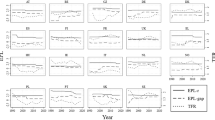Abstract
Using individual-level survey data that were collected in Russia in 1993, we analyze the fertility-employment relationship for a sample of urban women who bore children during the Soviet era. Although some Russian policy makers advocate policies that reduce female employment to stimulate fertility, we find little empirical support to ensure success of these policies. Specifically, we find no connection between employment and fertility for our sample of Russian females, perhaps because of their historic, mandated commitment to the labor market. Instead, we find that demographics and attitudes influence fertility decision making. These results, in combination with the findings that our sample of Russian women hold more ‘traditional’ attitudes toward family and ‘egalitarian’ attitudes toward work than similar American women, suggest that policies to stimulate fertility by reducing employment may not be effective for women raised during the Soviet era unless a dramatic shift in attitudes away from a strong work commitment also occurs.
Similar content being viewed by others
Author information
Authors and Affiliations
Rights and permissions
About this article
Cite this article
Maxwell, N.L. Fertility Policy and Employment: Implications from the Former Soviet Union. Population Research and Policy Review 17, 351–368 (1998). https://doi.org/10.1023/A:1006003826987
Issue Date:
DOI: https://doi.org/10.1023/A:1006003826987




